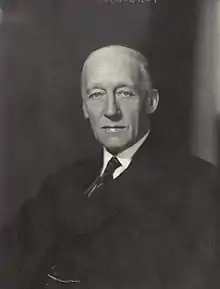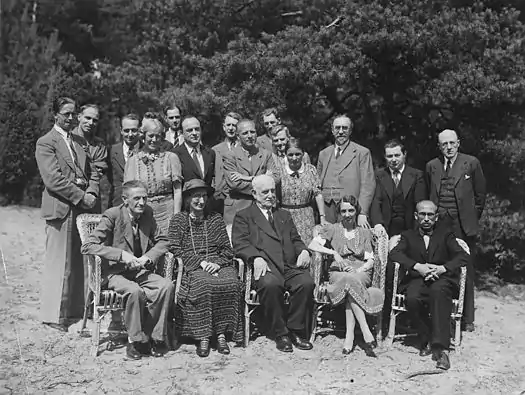Arthur Ponsonby, 1st Baron Ponsonby of Shulbrede
Arthur Augustus William Harry Ponsonby, 1st Baron Ponsonby of Shulbrede (16 February 1871 – 23 March 1946), was a British politician, writer, and social activist. He was the son of Sir Henry Ponsonby, Private Secretary to Queen Victoria, and Mary Elizabeth Bulteel, daughter of John Crocker Bulteel. He was also the great-grandson of The 3rd Earl of Bessborough, The 3rd Earl of Bathurst and The 2nd Earl Grey. The 1st Baron Sysonby was his elder brother.
The Lord Ponsonby of Shulbrede | |
|---|---|
 Ponsonby in 1934 | |
| Chancellor of the Duchy of Lancaster | |
| In office 13 March – 25 August 1931 | |
| Prime Minister | Ramsay MacDonald |
| Preceded by | Clement Attlee |
| Succeeded by | The Marquess of Lothian |
| Parliamentary Secretary to the Ministry of Transport | |
| In office 1929–1931 | |
| Preceded by | The Earl Russell |
| Succeeded by | John Allen Parkinson |
| Member of Parliament for Sheffield Brightside | |
| In office 15 November 1922 – 1930 | |
| Preceded by | Tudor Walters |
| Succeeded by | Fred Marshall |
| Member of Parliament for Sheffield Brightside | |
| In office 1908 – 25 November 1918 | |
| Preceded by | Henry Campbell-Bannerman |
| Succeeded by | Constituency abolished |
| Personal details | |
| Born | 16 February 1871 |
| Died | 23 March 1946 (aged 75) |
| Spouse | |
| Children | 2 (Elizabeth and Matthew) |
| Parents |
|
| Alma mater | Balliol College, Oxford |
Ponsonby is often quoted as the author of the dictum "When war is declared, truth is the first casualty", published in his book Falsehood in War-time, Containing an Assortment of Lies Circulated Throughout the Nations During the Great War (1928). However, he uses this phrase in quotation marks as an epigram at the start of the book and does not present it as his own words. Its likely origin is the almost identical line spoken in 1917 by the United States Senator Hiram Johnson: "The first casualty when war comes is truth".[1]
Education and early career
Ponsonby was a Page of Honour to Queen Victoria from 1882 to 1887. From an Anglo-Irish family, he was educated at Eton College. While at Eton, Ponsonby was whipped for organising a steeplechase in his dormitory.[2]
Ponsonby studied at Balliol College, Oxford, before joining the Diplomatic Service and taking assignments in Constantinople and Copenhagen.
Politics
At the 1906 general election, Ponsonby stood unsuccessfully as Liberal candidate for Taunton. He was elected as Member of Parliament for Stirling Burghs at a by-election of 1908, succeeding former Prime Minister Henry Campbell-Bannerman, who had died a few weeks earlier.
In Parliament, Ponsonby opposed the British involvement in the First World War and, with George Cadbury, Ramsay MacDonald, E. D. Morel, Arnold Rowntree, and Charles Trevelyan, he was a member of the Union of Democratic Control, which became a prominent antiwar organisation in Britain.

Ponsonby was defeated at the 1918 general election in which he stood as an "Independent Democrat" in the new Dunfermline Burghs constituency.[3] He then joined the Labour Party and returned to the House of Commons at the 1922 general election as member for the Brightside division of Sheffield.[3]
In 1924, Ramsay MacDonald appointed Ponsonby as Parliamentary Under-Secretary of State for Foreign Affairs, and he later served as Under-Secretary of State for Dominion Affairs and then as Parliamentary Secretary to the Ministry of Transport in 1929.

In 1930, Ponsonby was raised to the peerage as a hereditary baron, taking the title Lord Ponsonby of Shulbrede from his home at Shulbrede Priory in Sussex. He served as leader of the Labour Party in the House of Lords from 1931 until 1935, resigning because he was opposed to the party's support for sanctions against Italy for its invasion of Abyssinia.
In 1927–1928, Ponsonby ran a significant Peace Letter campaign against British preparations for a new war, and from 1936 he was an active member of the Peace Pledge Union, contributing regularly to Peace News.
Ponsonby opposed the initiative of Lord Charnwood and Cosmo Gordon Lang, Archbishop of Canterbury, to ask his Majesty's Government to react against the genocidal Holodomor policies of the Soviet Government.[4][5]
From 1935 to 1937, he was Chair of the International Council of the War Resisters' International.
Resignation
In May 1940, Ponsonby resigned from the Labour Party, opposing its decision to join the new coalition government of Winston Churchill.
He wrote a biography of his father which won the James Tait Black Memorial Prize in 1942: Henry Ponsonby, Queen Victoria's Private Secretary: His Life and Letters.
Death
Ponsonby died on 23 March 1946 and was succeeded by his son Matthew Henry Hubert Ponsonby.
Personal life and family
On 12 April 1893, he married Dorothea Parry, daughter of Hubert Parry and Elizabeth Maude Herbert (1851–1933), a daughter of Sidney Herbert, 1st Baron Herbert of Lea. They had a daughter, Elizabeth (1900–1940), who during the 1920s became well known as a leading figure of the Bright Young People,[6] and a son, Matthew (1904–1976), who became the 2nd Baron.
Arms
  |
|
Works
- Rebels and Reformers: Biographies for Young People, with Dorothea Ponsonby. New York: H. Holt and Company (1919). OCLC 1051763068.
- The Priory and Manor of Lynchmere and Shulbrede. Taunton: Barnicott and Pearce, and Wessex Press (1920). OCLC 1050747120.
- A Conflict of Opinion, a Discussion on the Failure of the Church. London: Swarthmore Press (1919). OCLC 1042381801.
- The Camel and the Needle's Eye (1910).
- The Decline of the Aristocracy (1912).
- "Democracy and Diplomacy" (1915)
- "Wars And Treaties" (1918)
- "A Conflict of Opinion: A Discussion on the Failure of the Church" (1922)
- "Now Is The Time: An Appeal For Peace" (1925)
- "More English diaries; further reviews of diaries from the sixteenth to the nineteenth century with an introduction on diary reading", (1927)
- Falsehood in War-Time (1928).
- "Samuel Pepys" (1929)[8]
- "Casual Observations" (1930)
- "John Evelyn, fellow of the Royal society: author of "Sylva" (1933)
- "Life Here And Now: conclusions derived From an examination of the sense of duration" (1936)
- The Little Torch: Quotations From Diaries Of The Past For Every Day Of The Year" (1938)
- Henry Ponsonby: Queen Victoria's Private Secretary:His Life from his Letters (1942).
See also
Notes
- Hiram Johnson in U. S. Senate, 1918, quoted in The Quote Verifier: Who Said What, Where, and When, by Ralph Keyes, Macmillan, p. 228, 2006, ISBN 0-312-34004-4
- "LORDS AMENDMENT (HL Deb vol 85 cc697-707)". Parliamentary Debates (Hansard). 7 July 1932.
- Craig, F. W. S. (1983) [1969]. British parliamentary election results 1918–1949 (3rd ed.). Chichester: Parliamentary Research Services. ISBN 0-900178-06-X.
- In the Parliament, in The Times dated 26 July 1934
- "Russia, vol 93 cc1097-117". Parliamentary Debates (Hansard). Hansard 1803–2005 Lords Sitting. 25 July 1934. Retrieved 9 January 2013.
- D. J. Taylor, Bright Young People: The Lost Generation of London's Jazz Age (2007).
- Debrett's Peerage & Baronetage. 2000.
- Forman, Henry James (20 January 1929). "That Immortal Plodder, Mr. Samuel Pepys; Arthur Ponsonby Writes an Excellent Short Biography of the Great Diarist". The New York Times.
Bibliography
- Jones, Raymond A. (1989). Arthur Ponsonby: The Politics of Life. Helm.
- Kidd, Charles, and David Williamson, eds (1990). Debrett's Peerage and Baronetage. New York: St. Martin's Press.
- Leigh Rayment's Peerage Pages
- Leigh Rayment's Historical List of MPs
External links
- Works by or about Arthur Ponsonby, 1st Baron Ponsonby of Shulbrede at Internet Archive
- Catalogue of the papers of Arthur Ponsonby at the Bodleian Library, Oxford
- Falsehood in War-Time: Propaganda Lies of the First World War by Arthur Ponsonby MP
- Two pictures of Ponsonby at The National Portrait Gallery (UK)
- Brief bio at Spartacus Schoolnet
- The Ponsonby Rule at the Wayback Machine (archived 1 August 2003) Google HTML of a PDF document.
- Arthur Ponsonby's Dream Archived 8 May 2006 at the Wayback Machine
- Hansard 1803–2005: contributions in Parliament by Arthur Ponsonby